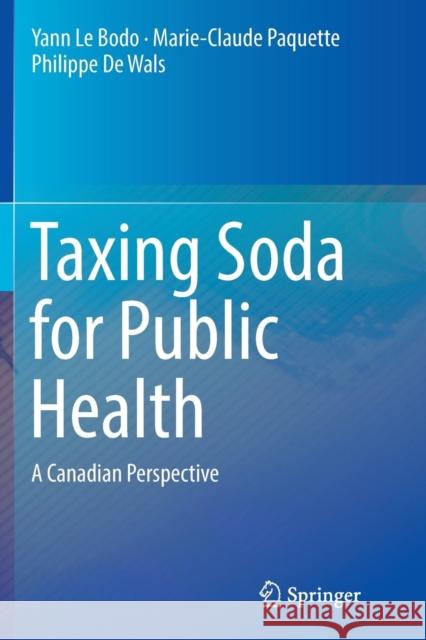Taxing Soda for Public Health: A Canadian Perspective » książka



Taxing Soda for Public Health: A Canadian Perspective
ISBN-13: 9783319815657 / Angielski / Miękka / 2018 / 244 str.
Taxing Soda for Public Health: A Canadian Perspective
ISBN-13: 9783319815657 / Angielski / Miękka / 2018 / 244 str.
(netto: 309,92 VAT: 5%)
Najniższa cena z 30 dni: 325,42 zł
ok. 20 dni roboczych.
Darmowa dostawa!
Summary
Yann Le Bodo, M.Sc., is a PhD student in community health at Laval University in the Faculties of Medicine and Nursing. Since 2012, he has been a project manager at the Evaluation Platform on Obesity Prevention (EPOP) set up by Laval University and the Québec Heart and Lung Institute in Québec City, Canada. Le Bodo is in charge of research projects on healthy eating and physical activity policies. An important part of his research has focused on sugar-sweetened beverage taxation in Canada. Le Bodo is co-author of several peer‐reviewed publications, as well as co-editor and co-author of the books Preventing Childhood Obesity: EPODE European Network Recommendations and L'Experience quebecoise en promotion des saines habitudes de vie et prevention de l'obesite: comment faire mieux?
Marie-Claude Paquette, Dt.P., Ph.D., is an expert and researcher at the Public Health Institute of Québec (Institut national de santé publique du Québec) in Canada. She is a registered dietician at Université de Montréal in Québec. Dr. Paquette has worked for the past 10 years at the Institut national de santé publique du Québec in a multidisciplinary team focusing on environmental and policy approaches for the promotion of healthy lifestyle habits and the prevention of weight-related problems. Her expertise lies mainly in the food environment and the sociocultural environment. Dr. Paquette has been involved in characterizing the school food environment and more recently in developing indicators using supermarket food purchases. Over the last few years, she has developed expertise in sugar-sweetened beverages following a governmental mandate on this topic. Dr. Paquette is the author of many government publications on topics associated with nutrition and the sociocultural dimensions of eating. Finally, she also is an associate professor at the Département de nutrition, Faculty of Medicine, of Université de Montréal.
Philippe De Wals, M.D., Ph.D., is professor in the Department of Social and Preventive Medicine, Faculty of Medicine, at Laval University, and scientific director at the Evaluation Platform on Obesity Prevention (EPOP) in Québec City, Canada. His research interests include the epidemiology of infectious diseases, birth defects and chronic conditions including obesity, as well as the evaluation of public health programs. Professor De Wals is the author of over 150 published articles in scientific journals and has contributed several chapters to textbooks. Currently, he is a medical advisor to the 'Institut national de santé publique du Québec' and to several national and international organizations. In 1990, Professor De Wals was awarded the Jean Van Beneden Prize in recognition of his excellent work in the public health field, and in 2005, he was elected to the Royal Academy of Medicine of Belgium.
This timely reference analyzes the rationale, impact, and feasibility of taxation of sugar-sweetened beverages (SSBs) as a public health measure to contribute curbing obesity and diabetes rates, specifically in Canada. It presents the pros and cons of taxing soda, with the latest data on adverse health effects of its consumption, plus the various business and political issues surrounding the contentious proposition. Reviewed research is multidisciplinary, spanning health and medicine to ethics, economics, and law. Conclusions and caveats are clear and presented at a comfort level for the general reader. The result is a blueprint for analyzing the relevancy of taxes on sweetened soft drinks or other low-nutrition food products, plus a trove of valuable insights into aspects of government decision-making and consumer food behavior.
Included in the coverage:
· Reasons for specifically targeting SSBs
· SSB taxation as a public health policy instrument
· Effects of SSB taxation on energy intakes and population health
· Potential undesirable effects relating to SSB taxation
· Social and political acceptability of SSB taxation
· Evaluability of SSB taxation
Taxing Soda for Public Health will interest policymakers, public health professionals, advocacy groups, and researchers at the Canadian and international levels (e.g., in areas such as public health, nutrition, food and health policies, health economics, and evaluation), as well as students and all other parties interested in nutrition policies.
1997-2024 DolnySlask.com Agencja Internetowa
KrainaKsiazek.PL - Księgarnia Internetowa









